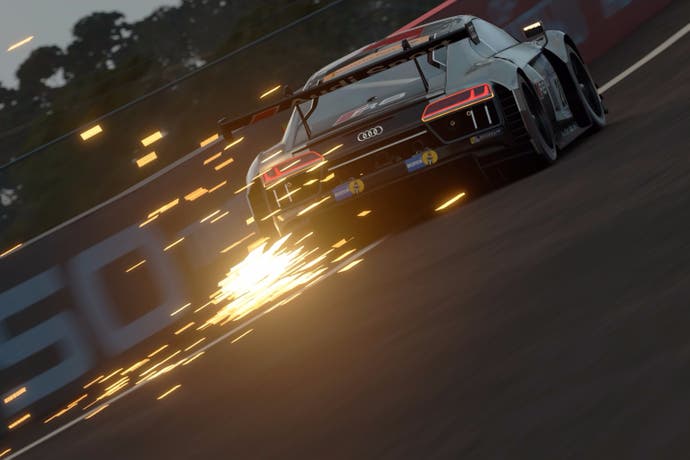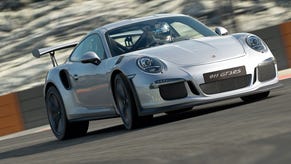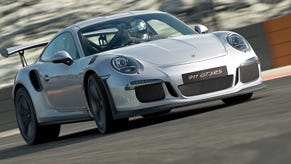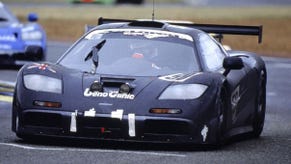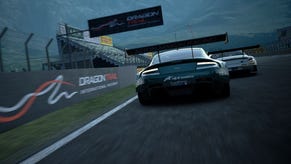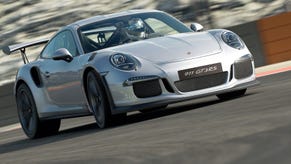Gran Turismo Sport review
Off to the races.
Something had to give. After Gran Turismo 6, a wild, vast and maddeningly uneven game that whisked players from West Sussex to the moon and back in its eccentric hymn to the automobile, developer Polyphony Digital had to try a different tack. The result, a typically belated debut on Sony hardware from a studio renowned and often reviled for taking its sweet time over things, will likely prove as divisive as any Gran Turismo before it.
Judged by numbers alone - and as a reflection of the automotive industry, one that's driven by a pursuit of bigger digits whether they're measured in mph or mpg, Gran Turismo Sport surely begs to be - this falls miserably flat. Judged even by past entries in the series, let alone the broader driving genre, it comes up short. The 162 cars on offer at launch are a mere fraction of the 1200 featured in Gran Turismo 6, its 40 tracks well under half of what was available last time out. There are other painful edits elsewhere: dynamic day/night transitions are out and, bar one rain-slicked car park, there's not much by way of variable weather conditions to be found at launch.
Given how savage those cuts have been, what exactly has been gained? A certain consistency, for one - Gran Turismo 6 and its immediate predecessor were both generous games, but also games in which older car models with their roots in the PlayStation 2 era sat uncomfortably alongside all-new 'premium' models. It made for an experience that was just as often unsightly as it was beautiful to behold. Gran Turismo Sport, however, feels premium throughout, as glossy as a high-end car brochure from its impeccably stylish menus through to its exquisite car models. This is, more often than not, an exceptionally pretty video game.
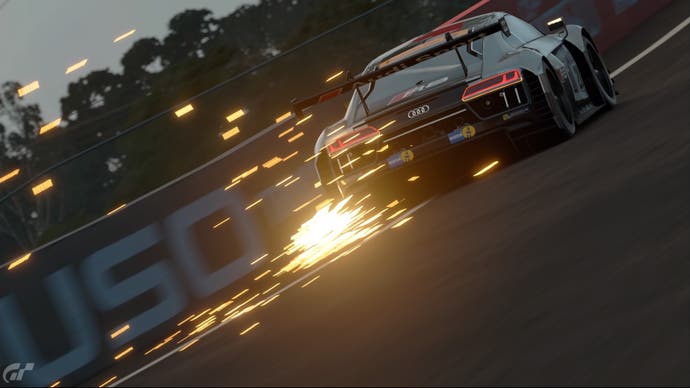
It is, for perhaps the first time in Gran Turismo's long history, a fine sounding one too. You won't find the drama and world-ending thunder of RaceRoom in the audio, but you will find a closer approximation of the wonderful music of the automobile, whether that's the finessed grinding transmission of a track-bred Audi R8 as it whines its way down through the gears or the off-throttle exhaust burble and pop of a road ready Jaguar F-Type. It all helps each car feel that little bit more distinct from another.
All of which helps reinforce one of Gran Turismo's traditional strong suits: this is a game where each individual car has a very tangible sense of character. Take a stretch of tarmac such as the Nürburgring's Brünnchen, with its improbable inclines and cambers, and contrast and compare a small selection of Gran Turismo Sport's garage. The lowly fourth generation Mazda MX-5 provides perhaps the most fun, its lithe chassis allowing big and burly lunges at the steering wheel before it even thinks about biting back. Take the all-wheel-drive Nissan GT-R and revel in its copious traction and even more copious power as it breaks out into whip-quick, perfectly catchable slides. And then take to that same stretch behind the wheel of a GT3 car and marvel at how it effortlessly devours all that asphalt.
Gran Turismo has always boasted best-in-class handling, and Sport is no different in that regard - indeed, if it wasn't for the relatively recent arrival of Assetto Corsa, this could happily boast of being the finest driving pure driving experience available on console. It's not quite there - the lack of full support for clutch simulation, and a handful of other small gripes, hampers its cause somewhat - but it's a compelling ride all the same, acquitting itself well regardless of whether you're playing on pad or wheel. Gran Turismo Sport's weight transfer sets it apart from its peers, its cars feeling truly alive upon braking and cornering, and regardless of whether it's the most authentic of sims or not I don't think any driving game is able to communicate quite so effectively the difference between a FWD Golf GTI and a midship sportscar such as the Alfa Romeo 4C.
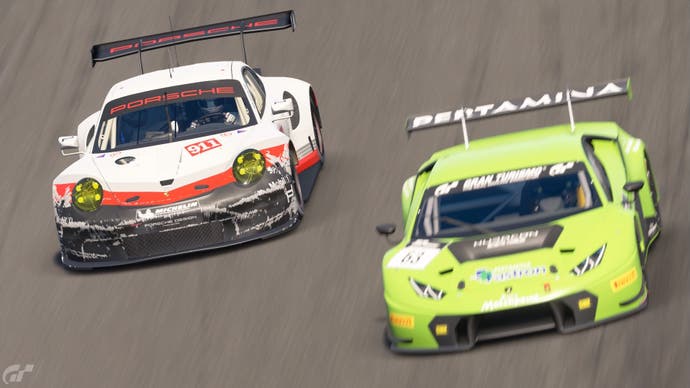
Sadly it's no longer possible to take the digital approximation of whatever might be in your driveway out for a spin, as gone are the more pedestrian rides - unless, of course, you're a much luckier person than I and can count a little slice of performance exotica as your daily. Gran Turismo Sport's slimmed down carlist does away with the everyday as well as the classics and esoterica, placing a hard focus on machinery that's geared towards racing.
There's that same focus throughout Gran Turismo Sport, a game that - if that name hadn't already given it away - puts a heavy emphasis on competitive driving. Cars are neatly arranged into classes that then provide a foundation for online racing, working up from sporty road-legal vehicles to GT3 and GT4 and through to Gran Turismo Sport's further flung, fictional extremes (a large portion of the garage, excused by Polyphony Digital's 'Vision' collaborations with manufacturers, feels like it's strayed in from the furthest reaches of Ridge Racer Type 4).
Indeed, every part of Gran Turismo Sport feels like it's funneled towards that same goal, lending the series the focal point that it's perhaps lacked for some time. The campaign, as it is, is no longer about tricking out a family sedan or amassing a vast collection of cars - it is, quite simply, about making you a better driver.
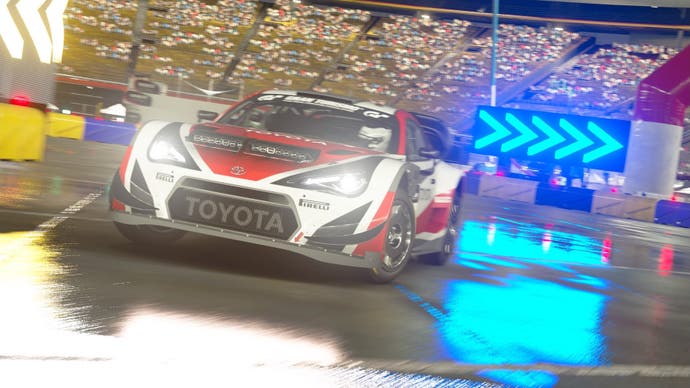
There are the driving lessons, variants on the age-old license tests, and circuit challenges that dial you into a track, section by section, until you're its master. Then there are the mission challenges, a run of tasks that range from knocking down clusters of cones to, later on in the campaign, full-on endurance events that teach you the importance of tyre and fuel maintenance, and the advantages to be gained from a well-timed pitstop and a smart race strategy.
Some might miss the old grind, but in its place there's a more meaningful progression as you work to level up your own skill (and, if you want to earn a gold in each and every event, there's likely just as many hours to be lost here as there ever was in a single-player Gran Turismo). There are tools in place to assist your education; the driving line assist, for so long a dumb ribbon that's reduced many other racers into games of wire loop, has evolved into something more useful, with entry, apex and exit points discretely marked and leaving you to join the dots. It's a small but significant innovation.
If the campaign is geared towards making you a better driver, the online puts systems in place to ensure you're a better racer. I've already spoken a little about how Gran Turismo Sport wisely cribs from iRacing, in my view the premier sim on PC, for its online, appropriating the safety rating system that leads towards fairer, more enjoyable racing. It borrows from elsewhere, too, its lexicon lifted from sportscar racing; events are bound by Balance of Performance, the tweaking that takes place in real-life sportscar racing to ensure all competitors are on an even keel. There's even a button dedicated to flashing your lights as you bear down on your opponent - sportscar racing's equivalent of the fighting game taunt.
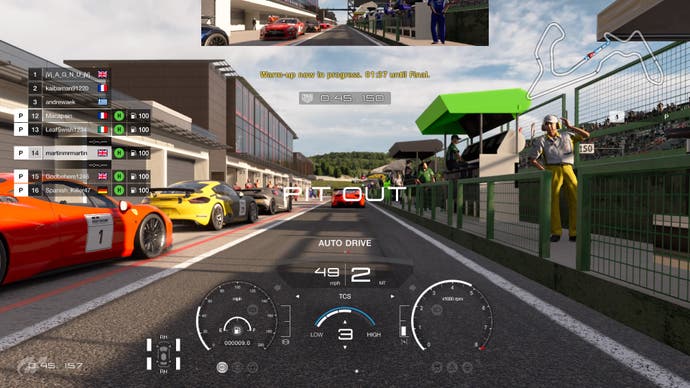
The result is some of the most exciting online racing I've come across on console, an enjoyably approachable spin on iRacing's formula that makes for tense and - mostly - fair match-ups. There have been quirks throughout the demo and beta periods, and there will always be those left scratching their heads by the necessary rule that means any contact between players means both will see their safety rating hit, but Polyphony Digital has been quick to address issues. The foundation is there for something special - though we'll have to wait until early next month, when online championships that join the daily races currently available go live, to see where exactly this is headed.
What shape Gran Turismo Sport's future will take remains to be seen, and Polyphony Digital is, not altogether wisely, being enigmatic about how exactly these strong yet slim foundations will be supported in the coming months. There will be updates, with cars and tracks inbound - though whether or not we'll have to pay for the restoration of the tracks and cars that have defined the series and been cast aside for Sport is a matter that is still perfectly unclear. For all the positive changes ushered in by Gran Turismo Sport, some things remain the same.
Some things have surely changed for the better, though. Gran Turismo has come in for criticism in the past for operating in a bubble, of ploughing its own path in ignorance of everything else that's going on in the genre. Gran Turismo Sport feels, for the first time, like a little of the outside world is being let in. In its inclusion of features like a livery editor - and a fairly decent one at that, allowing you to create your own designs and share them online - and its slim implementation of virtual reality, this once antiquated series is even in danger of feeling positively modern.
Let's not forget what's been lost for the series' PlayStation 4 debut, though. There's none of that old scope, and only a fraction of the old madness that made Gran Turismo so endearing. There are no lunar rovers, no 19th century single horsepowered wagons and not even anything by way of an open wheel racer to be found in its car list at launch. Yet, conversely, this is possibly the most focussed, directly enjoyable game Polyphony Digital has put out since the heady days of Gran Turismo 3. Racing improves the breed, industrialist Soichiro Honda once said, and Gran Turismo Sport is proof positive of that.
